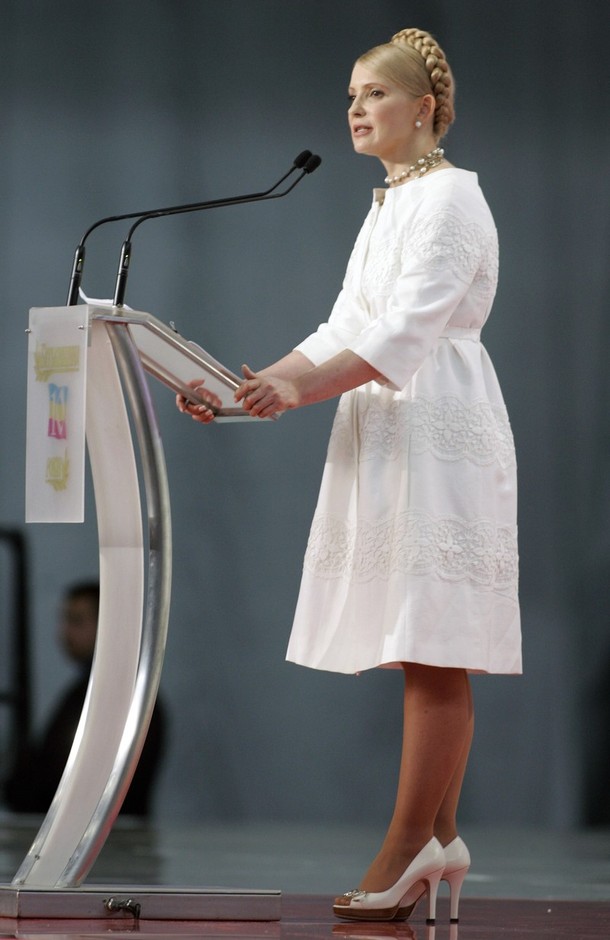
Tymoshenko Faces Damaging Domestic Gas Price Increases
Publication: Eurasia Daily Monitor Volume: 6 Issue: 140
By:

European Commission (EC) and Ukrainian government experts will meet in Kiev on July 24 to discuss Ukraine’s request for a loan to pump Russian gas into underground reservoirs for the winter. As the Naftohaz Ukrainy state-controlled oil and gas behemoth is nearly bankrupt, Ukraine has to borrow abroad to ensure the stable provision of gas for its industry and households as well as uninterrupted transit of Russian gas to Europe. Ukraine will have to finally launch serious reform of its gas industry if it wants to qualify for the loan.
In June the Ukrainian Prime Minister Yulia Tymoshenko asked the E.C. for $4.2 billion after Moscow refused to provide a $5 billion loan and suggested that Kyiv should turn to Brussels. However, the E.C. estimated that Ukraine should not need more than $2 billion to buy sufficient gas for storage (UNIAN, July 7). Tymoshenko’s energy adviser Oleksandr Hudyma conceded that the government wanted to borrow money not only to buy gas but also to finance Naftohaz’s deficit. However, the E.C. is apparently reluctant to do that at the expense of European taxpayers (Delo, July 21). The E.C. and international banks requested that Ukrainian officials provide detailed information on reform plans for the country’s gas sector in order for Europe to decide on the loan, E.C. Spokesman Mark Gray announced in Brussels after E.C. officials met with representatives of international banks, Ukraine and Russia (Interfax-Ukraine, July 17).
The Ukrainian business daily Delo reported on July 21 that the E.C. had drafted a list of specific conditions for Ukrainian gas sector reform ahead of the upcoming consultations. The conditions that Ukraine has to meet before receiving the loan, according to Delo, include: formulating a step-by-step schedule for increasing domestic gas prices; organizing an independent audit of the Ukrainian gas storage facilities to determine the exact sum required to buy enough Russian gas for storage; increasing the gas sector’s transparency by regularly reporting key financial indicators; and adopting a new law on state procurement.
The short-term conditions, to be met by October, include increasing social protection in order to mitigate the effect of the planned gas price increase on the population; streamlining the system of payments for utilities in order that they go to one central account; and removing privileges for certain industries. The E.C. probably meant the chemical and metallurgy industries, since they are Ukraine’s most important but least energy-efficient industries, and they traditionally enjoy various preferences as far as gas supply is concerned.
Also in the midterm, until 2011, Ukraine will have to undertake an upgrade of its gas import and transit meters and give independence to the gas transit and gas extraction subsidiaries of Naftohaz Ukrainy. These latter conditions are not new. They were discussed at the investment conference on the modernization of Ukraine’s gas transit system in Brussels on March 23 and were largely rejected by Russia.
The condition on the gradual increase in the price of gas for domestic consumers coincided with the IMF’s requirements, which Ukraine has to meet in order to qualify for the next tranches of the IMF’s $16.4 billion stabilization loan. The Ukrainian government promised the IMF that it would increase the domestic price of gas by 20 percent every quarter. The difference between the price for which Naftohaz buys gas from Russia ($228 per 1,000 cubic metres of gas on average in 2009) and the price paid by the mainly state-controlled heating companies to Naftohaz ($154) is currently subsidized from the state budget. Ukrainian experts have calculated that hot water and heating bills might eventually double if the E.C.’s and the IMF’s conditions are accepted (Kommersant-Ukraine, July 20).
It will be difficult for Tymoshenko to accept the domestic gas price increases ahead of the January 17, 2010 presidential election, especially as she pledged on numerous occasions in the past not to raise the price of gas as long as she remains prime minister. Yet Tymoshenko will have to accept the E.C.’s conditions if she cannot find money for gas storage elsewhere. It was reported earlier that she was seeking loans from Russia through the Troika-Dialog investment company, which reportedly has links to the Kremlin. Ukrainian President Viktor Yushchenko’s energy aide Bohdan Sokolovsky most recently warned Tymoshenko against seeking loans from offshore companies through Troika-Dialog. Sokolovsky accused Tymoshenko of dragging her feet over the E.C. loan while holding "secret" talks on loans from other sources (www.liga.net, July 20).
Tymoshenko dismissed the accusations saying that all respective talks were "in line with the law." Meanwhile, the first step consistent with the E.C. requests has been taken. The national energy regulation commission was told to increase the price of gas by 20 percent for households from September 1 and for heating companies from October 1. Commission chairman Valery Kalchenko hurried to tell a press briefing that the request came from Yushchenko rather than Tymoshenko. Kalchenko stressed that his boss Tymoshenko has been against making gas more expensive for people (Interfax-Ukraine, July 20).




